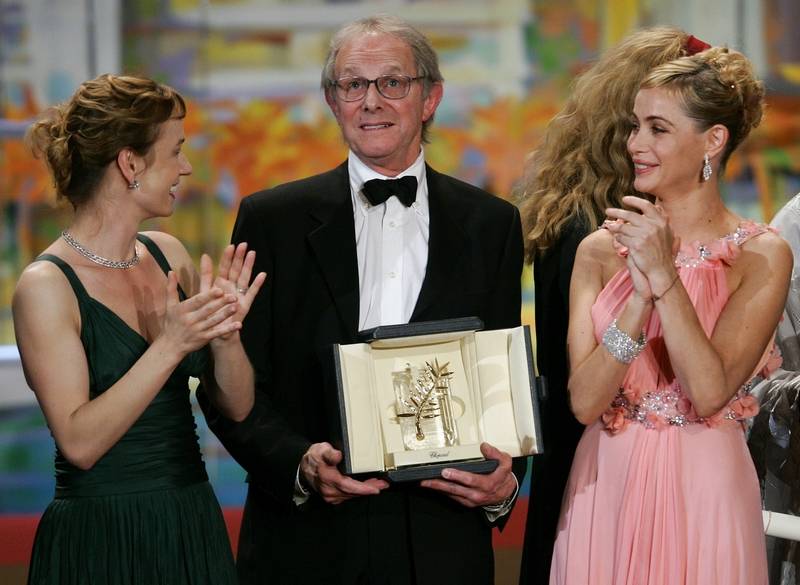List of winners at the 59th Cannes Film Festival
Awards given Sunday at the 59th Cannes Film Festival, selected by a nine-member jury headed by Hong Kong director Wong Kar-wai:
Palme d’Or (Golden Palm): “The Wind That Shakes the Barley,” Ken Loach, Britain.
Grand Prize: “Flanders,” Bruno Dumont, France.
Jury Prize: “Red Road,” Andrea Arnold, Britain.
Best Director: Alejandro Gonzalez Inarritu, “Babel,” Mexico.
Best Actors: Jamel Debbouze, Samy Naceri, Roschdy Zem, Sami Bouajila, Bernard Blancan, “Days of Glory,” Algeria.
Best Actresses: Penelope Cruz, Carmen Maura, Lola Duenas, Blanca Portillo, Yohana Cobo, Chus Lampreave, “Volver,” Spain.
Best Screenplay: “Volver,” Pedro Almodovar, Spain.
Golden Camera (first-time director): “A Fost Sau N-A Fost?,” Corneliu Porumboiu, Romania.
Best short film: “Sniffer,” Bobbie Peers, Norway.
CANNES, France — Ken Loach’s “The Wind That Shakes the Barley” won the Palme d’Or in the Cannes Film Festival here Sunday, and that was a surprise and a delight in about equal measure. The film stars Cillian Murphy in the harrowing story of how the Irish Republican Army waged war against the British and enforced deadly discipline within its own ranks.
Secrecy surrounding the jury was tight and pre-awards gossip entirely overlooked the Loach film, even though it got strongly positive reviews. When juror Samuel L. Jackson told one insider the jury “was going to kick some butt and surprise everybody,” that seemed to mean the apparent front-runner, Pedro Almodovar’s “Volver,” would be overlooked — but no one I talked to predicted the Loach victory.
The movie is a powerful drama in which Murphy is a young medical student on his way to London in the early 1920s when personal experience of British mistreatment of the Irish causes him to join the IRA instead. At one point, his commitment to the cause requires him to execute a friend.
Wong Kar Wei, the Hong Kong director who was president of the jury, said after the awards that the decision was unanimous. Loach said in his acceptance speech that the film encouraged Britain to confront imperialism in its past, adding, “If we can tell the truth about the past, maybe we can tell the truth about the present.” This marks the seventh Loach film in the official competition, but his first winner.
In a festival first, the jury honored ensembles with both of its acting awards. All of the female stars of Almodovar’s “Volver,” including Penelope Cruz and Carmen Maura, won as “best actresses,” and the best actors were the stars of Rachid Bouchareb’s “Days of Glory,” the story of Algerian and Moroccan troops who fought in the French army in World War II but were discriminated against at the time and later had their veterans’ pensions taken away.
The Grand Prix, unofficially considered second prize, went to “Flanders” by Bruno Dumont. The French film involves a young soldier who returns home much changed by the experience of combat.
“Red Road,” by British director Andrea Arnold, won the Special Jury Prize. It stars Kate Dickie as a woman who watches a public surveillance camera, and one day sees an unexpected face.
Alejandro Gonzalez Inarritu’s “Babel,” thought to be a front-runner for the Palme d’Or, won him the best director prize. The Mexican director of “Amores Perros” and “21 Grams” once again made a film of interlocking stories, this one involving barriers of borders and language in Morocco, the Mexican-U.S. border, and Japan. The film’s best-known stars are Brad Pitt and Cate Blanchett.
Almodovar won the screenwriting award for the “Volver” screenplay, which he said was inspired by his mother and his friends as he observed them while growing up in La Mancha. Cruz plays a character based on his mother, and Maura on his grandmother, who fakes her own death and then appears to people as a “ghost.”
The Camera d’Or prize, given to the best first film, went to “12:08 East of Bucharest,” a Romanian film by Corneliu Porumboiu.
The grand prize in the Critics’ Week, given separately from the main event, went to “Poison Friends,” by Emmanuel Bourdieu of France. The Fipresci Award, voted by members of the worldwide critics’ organization, went to “Climates,” by the Turkish director Nuri Bilge Ceylan.
Jury members, in addition to Wong and Jackson, were Monica Bellucci, Helena Bonham Carter, Samuel L. Jackson, Patrice Leconte, Lucrecia Martel, Tim Roth, Elia Suleiman and Zhang Ziyi.












